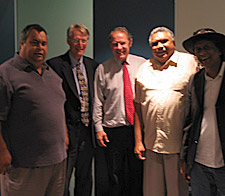 Aboriginal pastors say the welcoming of Indigenous Christians to the Diocese's governing body could start more Aboriginal churches and encourage their people to pursue theological education.
Aboriginal pastors say the welcoming of Indigenous Christians to the Diocese's governing body could start more Aboriginal churches and encourage their people to pursue theological education.
Redfern minister and chair of the Diocese's Indigenous board, Ray Minniecon, says the decision to accept two Indigenous representatives onto the Synod is "huge' and it will give Aboriginal people greater opportunities to proclaim the gospel.
“It's a huge decision " it's very historic,” Mr Minniecon says.
“The motion means Aboriginal Christians for the first time [can] make decisions about the furtherance of the gospel in Australia.
"There's a lot of things we can start to address " social justice issues as well as building churches and seeing our culture survive for another 50,000 years.
"It gives us the opportunity of having a say in how the gospel is proclaimed within our country. We look forward to participating in the life of the church with a little more equity."
Giving Indigenous Christians a voice
Archbishop Peter Jensen has thrown his weight behind the move, telling Synod members in his Presidential Address that he believes ‘the Lord has moved among us in the creation of [Indigenous] churches'.
"We can never forget the debt we owe to the first inhabitants of our land," Dr Jensen says.
The Diocesan Registrar Philip Selden says it not been easy for Indigenous people to be part of Synod, as there is no separate parish and none is of a sufficient size to be become a recognised church.
The passing of the ordinance means that from 2007, two representatives from the Diocese three Indigenous churches " one clergy and one lay " will be elected to the Synod. It will be formally approved when Synod reconvenes on Monday.
The representatives will most likely come from the Sydney Anglican Indigenous Peoples' Ministry Committee.
The Rev Neville Naden, pastor of Mount Druitt Indigenous Peoples' Church, says the acceptance took over 200 years, but it is a great encouragement to his people.
"We're excited because Sydney Diocese is taking Indigenous ministry seriously and that's encouraging us greatly," Mr Naden says.
"Some will see it as a formality but we see it as a step in the right direction, having a say over issues that affect the direction of Indigenous ministry."
Helping Aboriginal people to train for ministry
Ray Minniecon says being represented at the Synod means Aboriginal leaders can encourage Aboriginal Christians to train for ministry.
"We can nut out a way forward for our people to get training within the existing structures [and outside them]," he says.
"It gives us a great opportunity to give our people an opportunity to study theology through Aboriginal eyes."
Mr Naden agrees, saying Aboriginal leaders need to challenge the Diocese, in particular Moore Theological College, to provide adequate and appropriate training, "not by academics but by Indigenous Christian leaders'.
Mr Naden says local parishes also need to be challenged to support Aboriginal people in ministry.
"We'd like parishes to be in genuine partnership," he says.
"What I mean by that is we'd like to see parishes get behind and support the needs of the congregations they're in partnership with and commit resources."






















